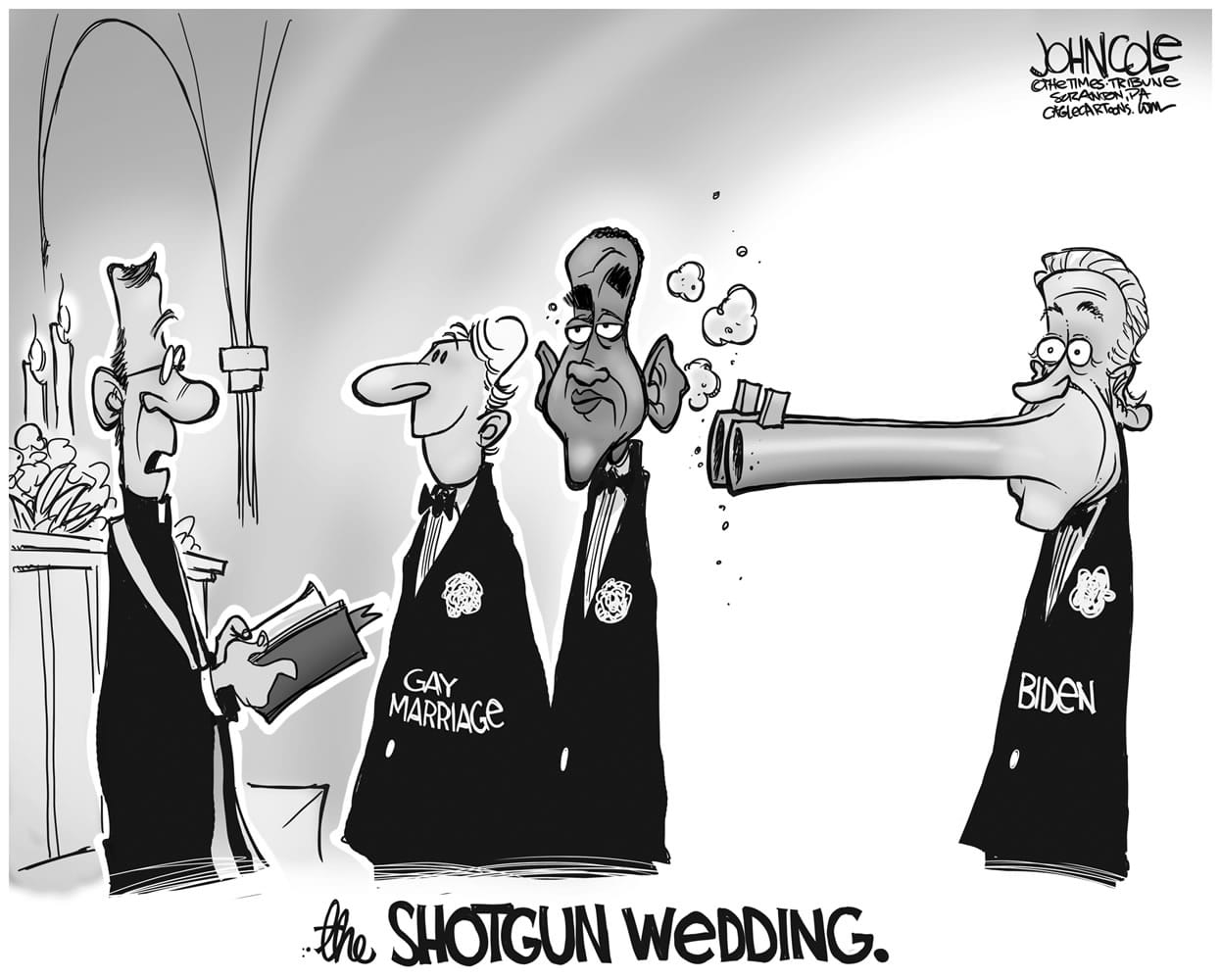President Obama’s announcement Wednesday that he was done “evolving” and now supports same-sex marriage was, in retrospect, inevitable. Vice President Joe Biden made it so Sunday, when he remarked almost casually that he had grown “comfortable” with gay marriage.
Obama opposed state laws like the one passed in North Carolina last week denying same-sex couples the right to wed. But even as he opposed anti-marriage laws, he didn’t support pro-marriage laws.
Still, I’m willing to cut Obama some slack on this issue. Like a lot of Americans, he was blindsided by the astonishing pace of change in public opinion on an issue that seemed almost immovable only a few years ago.
As recently as 2004, a Pew Research Center poll found that 60 percent of Americans were opposed to allowing same-sex couples to marry, with 36 percent strongly opposed. By last month, those opposed had shrunk to 43 percent, with 22 percent strongly opposed.
“It’s difficult to think of any other issue on which that kind of change has occurred so quickly,” Pew Center President Andrew Kohut told me Tuesday.
What changed? A huge factor is generational, Kohut says. Young people — those born after 1980, who grew up seeing sympathetic gay characters on television — are in favor of gay marriage with a resounding 63 percent. Their grandparents, the pre-baby-boom elders born before 1946, are still mostly opposed, although their opposition has weakened too.
Another explanation comes from Indiana University sociologist Brian Powell, who led a research project on the issue funded by the Russell Sage Foundation. Powell’s surveys found that an increasing number of Americans say they have gay friends or relatives, and those who know gay people are more likely to favor gay marriage. The change, Powell says, wasn’t that people acquired new gay relatives; rather, their gay relatives were more likely to be open about their sexuality. And it turns out that once you’ve learned that your beloved Aunt Martha is a lesbian, you’re more likely to feel sympathetic toward gay people in general.
But that wave of change wasn’t visible in advance. In 2004, Republican strategist Karl Rove exploited fear of gay marriage as a means to drive socially conservative Republicans to the polls and to divide working-class Democrats. That year’s elections included no fewer than 13 state ballot measures to outlaw gay marriage, and the voters who turned out to support them helped George W. Bush win a second term.
In 2004, the “safe” position for a Democratic politician on this issue was to support civil unions.
And that was the position adopted by then-Sen. Obama, a politician whose first instinct is often to look for the middle ground. The problem, of course, was that public opinion was changing, and Obama’s safe middle ground was melting like a polar bear’s iceberg.
The politics still aren’t simple. Gay marriage is more popular than it was in 2004, but the shift in public opinion may have plateaued. The Gallup Poll found this month that 50 percent of Americans believe same-sex marriages should be legal, but that was down from 53 percent a year ago.
African-Americans and Latinos are still less hospitable to gay marriage than white voters, and Obama needs strong support from those minority groups if he is to win in November.
Swing states are a problem for the president too. He needs help is places like Ohio, Florida and Virginia, all three of which have passed gay marriage bans.
To Obama and his political advisors, it seemed to make sense, as a matter of practical politics, for the president to try to skate through this election year in his unfinished state of evolution.
Biden made that impossible — and at that point, Obama responded quickly. He sounded thoughtful in his interview with ABC News’ Robin Roberts. He talked about conversations with “friends and family and neighbors,” and with his daughters, “Malia and Sasha — they’ve got friends whose parents are same-sex couples.” He talked about gay members of his own staff “in incredibly committed monogamous relationships.”
And he talked about how knowing those people and having those conversations prompted him to change his views — just like a lot of other Americans.
Doyle McManus is a columnist for The Los Angeles Times. Email: doyle.mcmanus@latimes.com.



